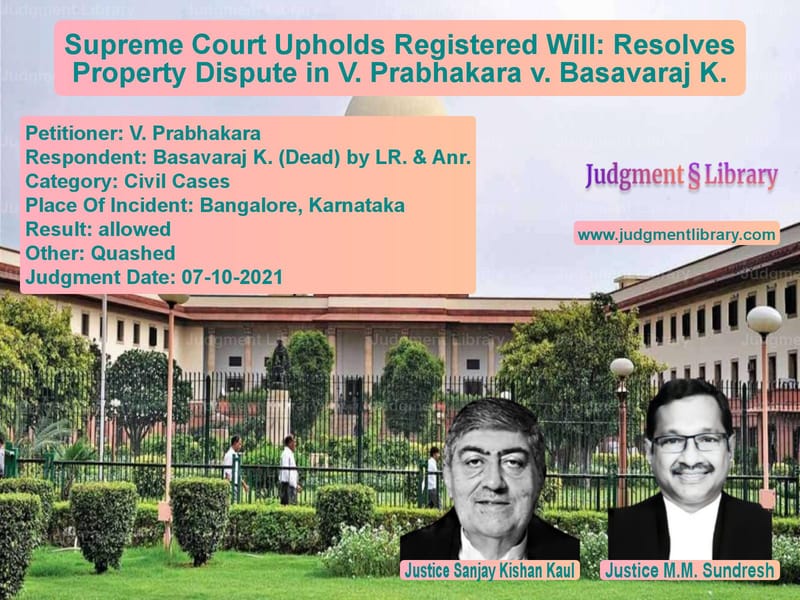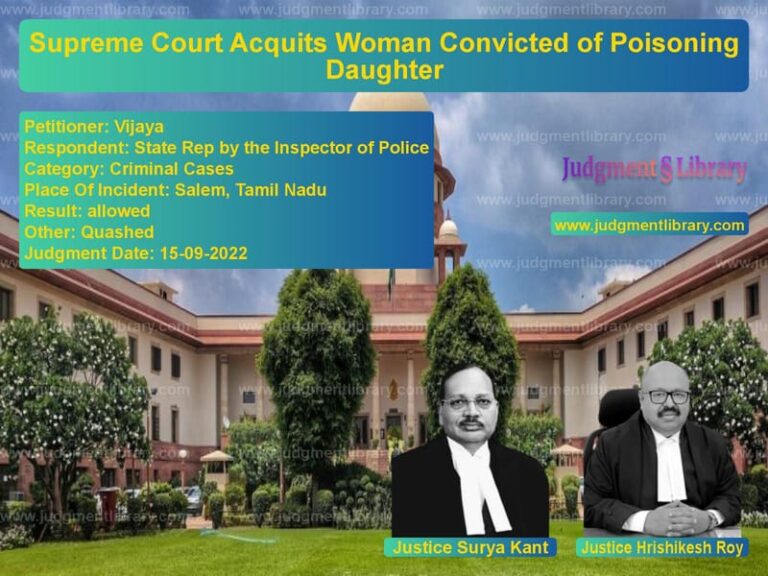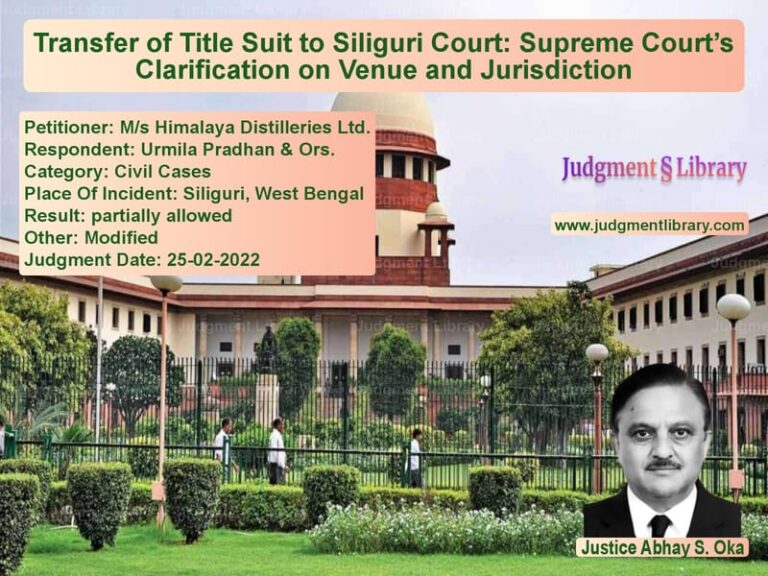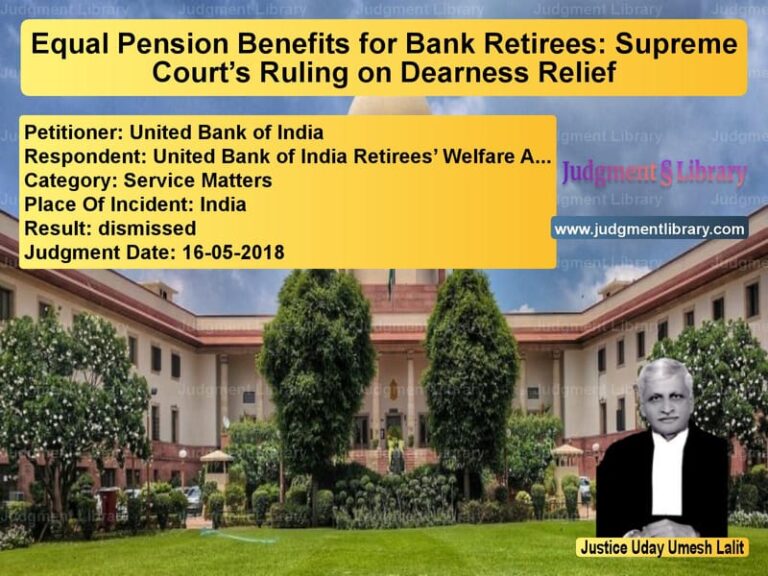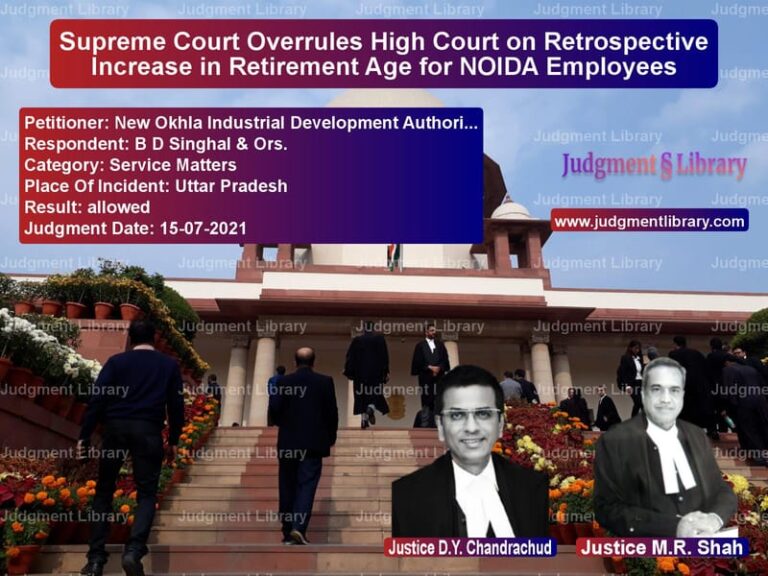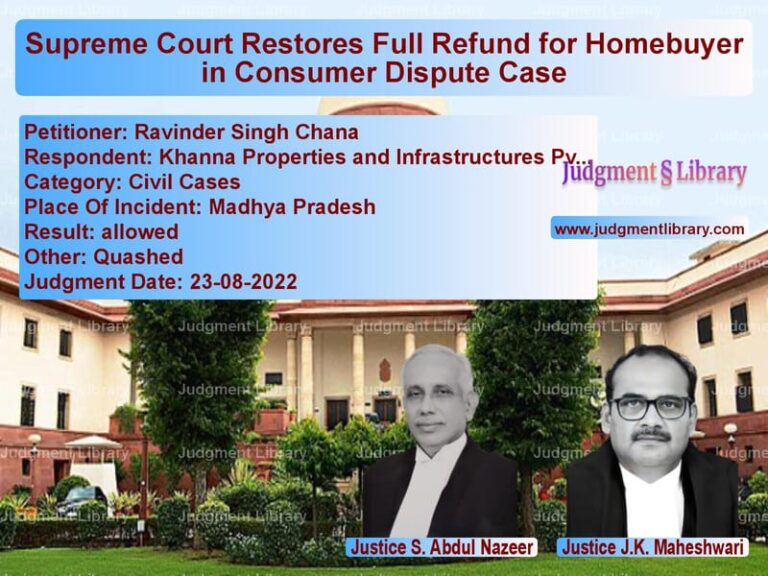Supreme Court Upholds Registered Will: Resolves Property Dispute in V. Prabhakara v. Basavaraj K.
The Supreme Court of India recently adjudicated a significant property dispute in the case of V. Prabhakara v. Basavaraj K.. The ruling reaffirmed the sanctity of registered wills and upheld the appellant’s rightful claim over the disputed property. The Court set aside the High Court’s judgment that had questioned the validity of the registered will without substantial reasoning.
Background of the Case
The property in question originally belonged to Ms. Jessie Jayalakshmi, a spinster. She was the maternal aunt of the appellant, V. Prabhakara. The appellant claimed that Ms. Jayalakshmi had adopted him as her son and that he had taken care of her when she was paralyzed.
To support his claim, the appellant presented a registered will dated 04.09.1985 (Exhibit P4), wherein Ms. Jayalakshmi had bequeathed the property to him. This will was attested by his brother, Mr. Vijay Kumar (PW2), and was executed in the presence of Ms. Kantha Lakshmi, the appellant’s sister.
On the other hand, the respondents, led by Basavaraj K., produced an unregistered will dated 16.08.1986 (Exhibit D1), claiming that it replaced the earlier registered will and transferred the property to the respondent’s minor son.
Legal Issues Examined
- Whether the registered will (Exhibit P4) was valid and binding.
- Whether the unregistered will (Exhibit D1) could override the registered will.
- Whether the High Court was justified in questioning the registered will without substantial reasoning.
- Whether the first appellate court had wrongly substituted its views without considering the trial court’s findings.
Petitioner’s (V. Prabhakara) Arguments
The appellant contended:
- The registered will (Exhibit P4) had been executed in full compliance with the law.
- The will was attested by credible witnesses, including his own brother (PW2).
- The unregistered will (Exhibit D1) was fabricated and executed under dubious circumstances.
- The trial court had correctly found Exhibit P4 to be valid, and the High Court had erred in creating unwarranted suspicion.
Respondent’s (Basavaraj K.) Arguments
The respondents countered:
- The unregistered will (Exhibit D1) was the final testament of Ms. Jayalakshmi and had replaced Exhibit P4.
- The appellant’s brother and sister were unfairly excluded from the will, which cast doubt on its authenticity.
- The first appellate court was justified in questioning the will since the testatrix’s intent was not clearly established.
- The appellant’s claim of adoption was unsubstantiated and should not influence property distribution.
Supreme Court’s Observations
On the Validity of Registered Wills
The Supreme Court emphasized the importance of a registered will in property disputes:
“When a will has been properly executed and registered, courts should not create unnecessary suspicion unless there is substantive evidence to support such doubts.”
On the Unregistered Will
The Court noted several inconsistencies in the respondents’ claim regarding Exhibit D1:
“The unregistered will suffers from multiple inconsistencies, including a smudged thumb impression, a missing scribe, and a dubious execution date close to the testatrix’s death.”
On the First Appellate Court’s Error
The Supreme Court criticized the High Court for creating suspicion where none existed:
“Suspicion must be based on evidence, not on conjecture. The High Court’s approach in raising doubts without substantial reasons was erroneous.”
On the Importance of Attesting Witnesses
The Court found that the appellant had met all legal requirements for proving the will:
“Section 68 of the Indian Evidence Act requires at least one attesting witness to prove a will. The appellant not only produced an attesting witness but also had corroborating evidence.”
Final Judgment
The Supreme Court ruled:
- The registered will (Exhibit P4) was valid and binding.
- The unregistered will (Exhibit D1) was fabricated and could not override the registered will.
- The High Court’s decision was set aside.
- The trial court’s ruling in favor of the appellant was restored.
- The respondents had no claim over the property.
Significance of the Judgment
- Reaffirms the Sanctity of Registered Wills: Establishes that a properly executed and registered will cannot be overridden by an unregistered document.
- Protects Property Rights: Ensures that rightful heirs receive their inheritance without unnecessary litigation.
- Limits Judicial Overreach: Reinforces that courts must rely on evidence rather than speculative doubts.
- Discourages Fabrication: Sends a strong message against attempts to introduce dubious documents to challenge registered wills.
Conclusion
The Supreme Court’s ruling in V. Prabhakara v. Basavaraj K. is a landmark decision that reinforces the legal sanctity of registered wills. By setting aside the High Court’s unwarranted doubts, the judgment ensures that testators’ final wishes are honored and protects beneficiaries from unjust property claims. The ruling is expected to guide future cases involving will disputes, promoting fairness and legal certainty in property inheritance matters.
Petitioner Name: V. Prabhakara.Respondent Name: Basavaraj K. (Dead) by LR. & Anr..Judgment By: Justice Sanjay Kishan Kaul, Justice M.M. Sundresh.Place Of Incident: Bangalore, Karnataka.Judgment Date: 07-10-2021.
Don’t miss out on the full details! Download the complete judgment in PDF format below and gain valuable insights instantly!
Download Judgment: v.-prabhakara-vs-basavaraj-k.-(dead)-supreme-court-of-india-judgment-dated-07-10-2021.pdf
Directly Download Judgment: Directly download this Judgment
See all petitions in Succession and Wills
See all petitions in Property Disputes
See all petitions in Specific Performance
See all petitions in Judgment by Sanjay Kishan Kaul
See all petitions in Judgment by M.M. Sundresh
See all petitions in allowed
See all petitions in Quashed
See all petitions in supreme court of India judgments October 2021
See all petitions in 2021 judgments
See all posts in Civil Cases Category
See all allowed petitions in Civil Cases Category
See all Dismissed petitions in Civil Cases Category
See all partially allowed petitions in Civil Cases Category

